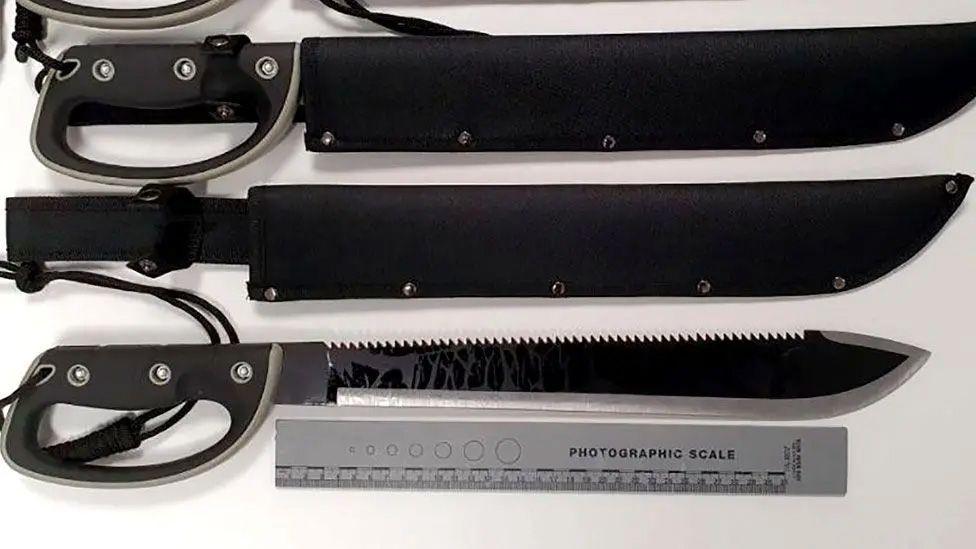Zombie knife and machete amnesty scheme starts

- Published
An amnesty and compensation scheme for people in England and Wales who possess zombie-style knives and machetes is starting ahead of the weapons being banned next month.
New legislation will close a loophole and make it an imprisonable offence to own, make, transport or sell a wide range of what are called ‘statement’ knives favoured by criminal gangs.
People who currently legally possess such knives can hand them in to police stations without fear of prosecution and, in some cases, claim compensation.
The new law, which comes into force on 24 September, will cover the manufacture, supply, sale, possession and importation of these weapons.
There are exemptions for people who have good reason to own the items, for example, a specialist machete used in forestry or an antique Samurai sword.
But, people who do own long-bladed weapons are advised to check with their local police on whether they fall foul of the law.
The Conservative government tried a ban in 2016, but a loophole meant some items bypassed the rule.
In January, the home secretary at the time, James Cleverly, announced zombie-style knives and machetes – which have a sharp edge on one side and a serrated edge on the other – would be banned under new legislation.
While possessing the large bladed weapons in public is illegal, a loophole meant they can be kept and sold if they do not have images depicting violence on their handles.
A change to the Offensive Weapons Act closes that loophole and will come into effect next month.
Hunting zombie knives in a city plagued by teenage violence
- Published16 August 2024
'My fight is for my son' - mum welcomes sword ban
- Published18 July 2024
'Zombie-style knives ban does not go far enough'
- Published19 August 2024
Earlier this month, Policing Minister Dame Diana Johnson said the ban was the first step in the government's plan to halve knife crime in a decade.
It would be followed by efforts to outlaw ninja swords, Dame Diana added.
But, the mother of 16-year-old Mikey Ryall who was fatally stabbed with a zombie knife near Bristol last June worries the new law will "not be enough" to combat knife crime.
"I wish the government would ask us [what we need] and listen to us because we're the ones living with it," Hayley said.
"Knives will still be available to get a hold of. It might not be a zombie knife... it could be a kitchen knife or it could be anything."
Ms Ryall said she didn't realise "how serious" knife crime was among youths until her son became a victim.
Tyler Clancy, a youth worker who lost a friend in a stabbing four years ago, said young people are "absolutely petrified" to be on the streets.
"Usually the young people that are carrying these knives are more so carrying them for their own safety and they have absolutely no intention of using them," he said.
He added that it was youth workers' job to remind them that "although they may feel unsafe the only answer is not just to carry a knife".